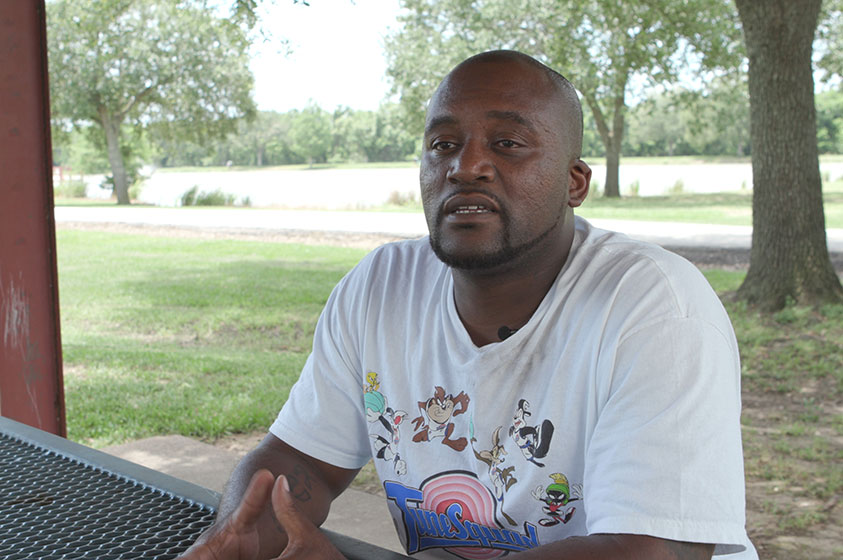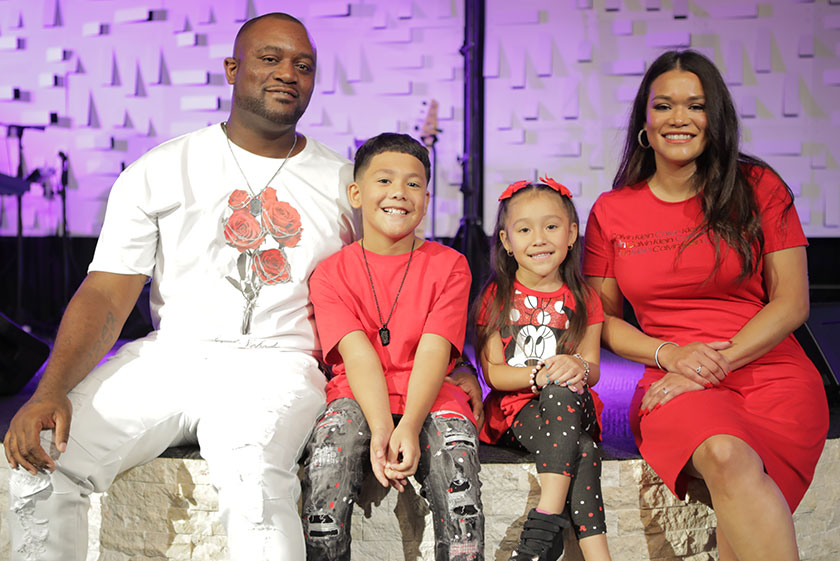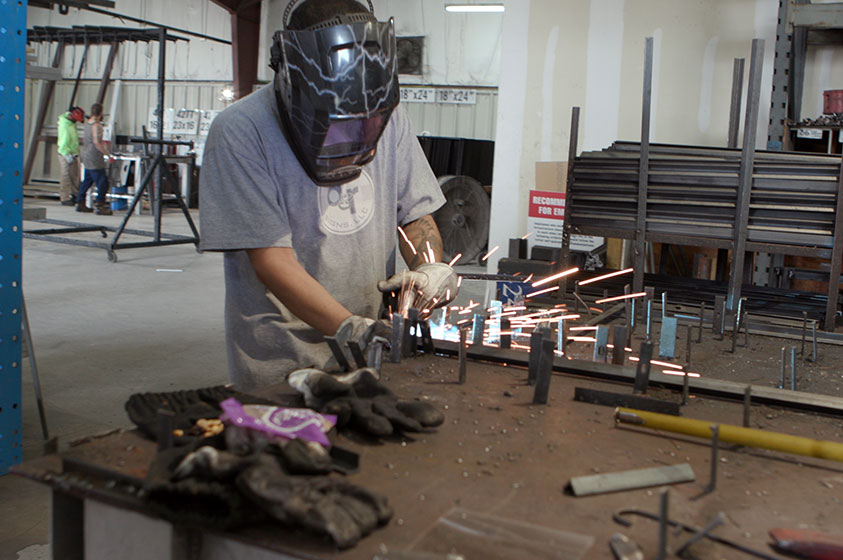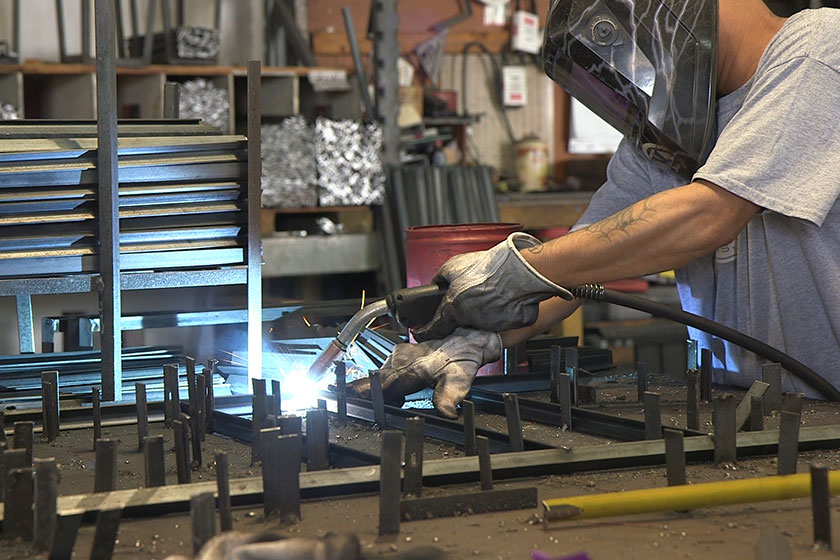-
FROM ROBBING CHURCHES TO HIRING FORMER PRISONERS
How Brandon is creating second chances for those coming behind him.
Brandon was 9 years old when he opened the envelope that would change everything. It contained a check made out to him, a payment from a social security account in a name he didn't recognize. In search of clues, Brandon started digging through a file cabinet. There he found a birth certificate with the same mysterious name.
"Who is Shirley Johnson?" Brandon demanded when his parents got home from work.
And then the truth came out—she was his mother. The couple raising him, whom Brandon had believed to be his parents, were his aunt and uncle. His "brothers" were his cousins. Brandon's mother had died when he was a baby, and no one had heard from his father in years.
Brandon left the house in a rage—and quickly became, in his words, "the kid other parents tell their kids to stay away from."
Before he was out of elementary school, Brandon had served time in juvenile detention for theft. He sold drugs, robbed people and stores, and was wrapped up in gang life. For every time he was caught, many more crimes went unpunished. Brandon says he was "hooked on getting away with it."
HOLDING UP THE HOUSE OF GOD
In the spring of 2004, the story was all over the Houston-area news: A pair of serial robbers had held up three different churches, drawing guns on people attending Bible studies and worship, walking away with thousands of dollars in cash and credit cards.
"Man, that's crazy!" Brandon would say when someone brought it up. "Who would do that?"
But 16-year-old Brandon knew exactly who: He would. It was an idea that came to him while he was high on PCP. Brandon had grown up going to church every Sunday and singing in the choir, but his only interest in churches now was robbing them.
"Money was my god," he says. "And I would do anything to get it."
It wasn't long before police connected gas station surveillance footage with a stolen credit card. Brandon was arrested and sentenced to 17 years behind bars.
When Brandon arrived at Clemens Unit, an adult prison in Brazoria, Texas, he was a terrified 17-year-old. But he knew how to camouflage fear with aggression. He says his first three years behind bars were extremely violent—both for him and for those who crossed him. He quickly rose to leadership within his gang, eventually coordinating an uprising in which prisoners took over the visitation room and held a guard hostage.
While in 24-hour lockdown, Brandon had many hours to read, and during that time, he decided to convert to Islam. Filled with shame for having robbed churches, he said to himself, Well, you don't want nothing to do with Jesus? Ain't nothing better than becoming a Muslim.

'Money was my god. And I would do anything to get it.'
A SECOND CHANCE WITH GOD
Eleven years after the beginning of his sentence, Brandon learned about the Prison Fellowship Academy® from a friend. He didn't understand what it was, but he filled out an application. Two weeks later, he was on a bus to the Carol S. Vance Unit in Richmond, Texas.
At Carol Vance, Brandon felt comfortable dropping some of the hardened persona he had created for himself. He even started attending church. One evening, he was listening to the pastor preach when he suddenly felt overwhelmed.
"I just felt so much shame and so much regret," Brandon says. "So much anger just towards myself, and I just broke down. I cried for all those years, all the pain, all the hurt, for the people I had hurt. I accepted Jesus that night."
Brandon sensed then that his sin had already been wiped away, and he had been given a second chance with God.
"I could hear the Holy Spirit telling me, 'I had already forgiven you,'" he says. "But I hadn't forgiven myself."
'I could hear the Holy Spirit telling me, 'I had already forgiven you.' But I hadn't forgiven myself.'
A CHANGED HEART AND MIND
The Prison Fellowship Academy uses targeted curriculum, compassionate coaches, and restorative community to replace participants’ criminal thinking and behaviors with renewed purpose and biblically based life principles. During his time in the Academy, Brandon was especially touched by the tenderness of the volunteers.
"[For 12 years], my only interaction is with inmates and guards," he says. "It is different when you got a volunteer praying for you, telling you they love you, and telling you about their family. And it was good."
Brandon was especially surprised because most of the volunteers were white.
"I had never dealt with good white people like that," he says. "So that opened up my eyes like, 'Hey, everybody's not racist. You got genuinely good people out here of all colors that just want to see you succeed.'"
This love made Brandon receptive to the instruction offered at the Academy—specifically about humility, integrity, and taking initiative. Brandon read the Bible many times over. He was no longer afraid to admit when he didn’t know something. He started to live with the knowledge that God sees everything. And Brandon knew that when he got out, he was going to live life differently.

'For 12 years, my only interaction [was] with inmates and guards. It is different when you got a volunteer praying for you, telling you they love you, and telling you about their family. And it was good.'
MOVING FORWARD AND UP
Brandon was released from prison in July 2017. He paroled to a halfway house—a move Brandon says was vital to his success. The halfway house was run by an Academy graduate who knew what returning citizens require in the early days.
"I needed the accountability and the resources," Brandon says. Staff at the halfway house gave Brandon rides to parole meetings and job interviews. They helped him relearn how to drive. "I think back, looking at all the people that get out and don't have that. I probably would've went to a family member's house, and I don't know how things would've played out."
By his third day after release, Brandon had secured two jobs—one at a T-shirt shop and the other at a moving company. He only made 8 dollars an hour, but he was grateful for the work. He could pay his rent and even saved up to buy a used car.
A few months later—thanks to a connection with a man who ministered at Carol Vance—Brandon was offered another job at a commercial sign company. He worked hard, learning all he could about every aspect of the business. He found his manager difficult to deal with, but Brandon had handled people like him while in prison. After just over a year, the manager left his position, and Brandon stepped up to cover his responsibilities.
"One thing about the Academy that it taught you was really taking initiative," he says. "I was just trying to do the right thing and fill in the void."
Brandon’s employers noticed and made him an assistant manager. In six months, he was promoted to head manager. His salary jumped $30,000 within a year.
Staff at the halfway house gave Brandon rides to parole meetings and job interviews. They helped him relearn how to drive. 'I think back, looking at all the people that get out and don't have that.'
HIRING FORMER PRISONERS
In his new role, Brandon became responsible for hiring new employees. And he knew exactly the kind of people he wanted on board.
"I immediately started hiring Prison Fellowship graduates," Brandon says. "People always ask me, 'What makes you hire people from prison?' Well, I'm from prison. I know that when you've experienced that kind of hunger and brokenness, it develops something in you that when you get out, you just want to work and do things right."
Brandon also points to qualities that are developed by Prison Fellowship Academy—qualities referred to as the Values of Good Citizenship™.
"One of the things we learned was integrity—what are you doing when not one else is watching?" he explains. "A lot of times when I'm working, I'm not here at the offices. So I need people to do what they're supposed to do when I'm not watching."
As a manager, Brandon has empathy for the complications of having a criminal record—which is not always the case in the workplace, where many returning citizens risk losing their jobs due to requirements of parole like attending meetings during business hours. But given his own history, Brandon is comfortable interacting with his employees' parole officers, granting time off for parole meetings, and giving small pay advances to people getting on their feet.


'I'm from prison. I know that when you've experienced that kind of hunger and brokenness, it develops something in you that when you get out, you just want to work and do things right.'
THE BENEFITS OF LEARNING FROM MISTAKES
In 2018, Brandon got married and became stepfather to three children. He serves as a youth pastor at his church, and Brandon and his wife are on the prayer team.
Brandon recently started a new job as a shift manager at Pepsi Bottling Ventures. He says that when he's interviewing a prospective employee, and he realizes they have a criminal record, his ears perk up.
"I'm more likely to hire them," Brandon says. "I tell people, 'Y'all been out here, living among the living. We've been in there, [and] we've been able to go through all our problems. We've been able to see, to look at all our past mistakes, to look at every single thing and actually see—compared to someone out here just going through the motions.'"
Brandon—who loves the opportunity to extend second chances—estimates he has hired about 29 formerly incarcerated people over the years, and of them, about half have been Academy graduates. Brandon prefers to hire Academy graduates whenever possible, due to the character they possess.
Brandon remembers the banners that adorned the Academy meeting area, each displaying a different core value.
"You don't realize how much it rubs off on you, the core values," he says. "Fellowship. Integrity. Those are thing things that are instilled in us for 18-plus months at a time. So I was always like, 'Shoot, I don't want to hire nobody else but somebody from Carol Vance.'"
'We've been in there, [and] we've been able to go through all our problems. We've been able to see, to look at all our past mistakes, to look at every single thing and actually see—compared to someone out here just going through the motions.'